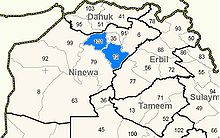Religion in Iraq
From Wikipedia, the free encyclopedia
| This article needs additional citations for verification. Please help improve this article by adding reliable references. Unsourced material may be challenged and removed. (December 2009) |
| Please help improve this article by expanding it. Further information might be found on the talk page. (October 2007) |

The major religion is Islam which is practiced by about 97% of Iraqis. The other 3% are Christianity, and other religions. Many cities throughout Iraq have been areas of historical prominence for both Shia and Sunni Muslims including Najaf, Karbala, Baghdad and Samarra.
Contents |
[edit] Religions
[edit] Islam
Iraq's Muslims follow two distinct traditions, Shia and Sunni Islam. According to the CIA World Factbook, Iraq is 97% Muslim.(60% Shi'a,37% Sunni). Iraq is home to many religious sites that is important for both Shia and Sunni Muslims. Baghdad was a hub of Islamic learning and scholarship for centuries and served as the capital of the Abassids. The city of Karbala has substantial prominence in Shia Islam as a result of the Battle of Karbala, fought on the site of the modern city on October 10, 680. Similarly, Najaf is renowned as the site of the tomb of Alī ibn Abī Tālib (also known as "Imām Alī"), whom the Shia consider to be the righteous caliph and first imām. The city is now a great center of pilgrimage from throughout the Shi'a Islamic world and it is estimated that only Mecca and Medina receive more Muslim pilgrims. The city of Kufa was home to the famed scholar, Abu Hanifah whose school of thought is followed by a sizable number of Sunni Muslims across the globe. Likewise, Samarra is also home to the al-Askari Mosque, containing the mausoleums of the Ali al-Hadi and Hasan al-Askari, the tenth and eleventh Shia Imams, respectively, as well as the shrine of Muhammad al-Mahdi, known as the "Hidden Imam", who is the twelfth and final Imam of the Shia of the Ja'farī Madhhab. This has made it an important pilgrimage centre for Ja'farī Shia Muslims. In addition, some female relatives of the Prophet Mohammad are buried in Samarra, making the city one of the most significant sites of worship for Shia and a venerated location for Sunni Muslims.
[edit] Christianity

Iraq's Syriac Christian minority represents roughly 3% of the population, mostly living in Northern Iraq, concentrated in the Ninewa and Dahuk governorates. There are no official statistics, and estimates vary greatly. In 1950 Christians numbered 7-10% of the population of 5.5 million. All Iraqi Priest in Iraq uses Allah for Arabic Eucharist Mass. Since the 2003 Iraq war, Iraqi Assyrians have been dislocated to Syria in significant but unknown numbers. The Syriac Christians of Iraq are divided into
- the "Eastern Assyrians" or "Nestorian Assyrian" group (Assyrian Church of the East & Ancient Church of the East);
- the "Western", "Jacobite", "Syriac Assyrian", group (Syriac Orthodox Church & Syriac Catholic Church);
- the "Chaldean Christians" or "Chaldean Assyrians" (Chaldean Catholic Church).
[edit] Yazdânism
The Yazidi live near Mosul and are made up of ethnic Kurds. Yazdânism dates to pre-Islamic times and Mosul is the principal holy site of the Yazidi faith. The holiest Yazidi shrine is that of Sheikh Adi located at the necropolis of Lalish. Aside from the Yazidi religion, there are also the religions of the Yarsan (locally called Kakeyi) and Alevi Shabaks.
[edit] Mandaeism
The Mandaean faith has existed in Iraq since the reign of Artabanus V of Parthia according to the Haran Gawaitha (secret wanderings) scroll of secondary Mandaean writ. This would make the Iraqi presence of Mandaeans at least 1,800 years old, making it the third oldest continually professed faith in Iraqi society after Zoroastrianism and Judaism. There are more Mandaeans in Iraq than there are Zoroastrians or Jews combined. In Iraq estimates of around 60,000 have been made. The oldest independent confirmation of Mandaean existence in the region is the Kartir inscription. The Mandaean faith is commonly known as the last surviving Gnostic faith and its adherents believe it to be the oldest faith on Earth, with at least some scholarly support for it being as old if not older than Christianity perhaps even being a major influence in the development of heterodox Jewish circles which eventually led to the formation of Christian beliefs, practices, rituals and theology. John the Baptist or Yahia Yuhanna is considered to have been the final Mandaean prophet and first true Ris'Amma, or Ethnarch, of the Mandaean people. Most Iraqi Mandaeans live near waterways because of the practice of total immersion (or baptism) in flowing water every Sunday. The highest concentrations are in the Mesene province with headquarters in Amarah, Qalat Saleh and Basra. Besides these southern regions bordering Kuzistan in Iran, large numbers of Mandaeans can be found in Baghdad in Dweller's Quarters of that city giving them easy access to the Tigris River.
[edit] Judaism
Judaism first came to Iraq under the rule of the Babylonian king Nebuchadnezzar II of Babylon. It was a part of the Babylonian Captivity. The once thriving Jewish community has survived, despite local 20th Century persecution on the background of the Arab-Israeli conflict. [1] The majority have fled, largely to Israel. Fewer than 100 Jews remain in Iraq.
[edit] Zoroastrianism
Zoroastrianism first came to Iraq when Babylon was conquered by the Persian Empire. Zoroastrianism in Iraq declined after the fall of the Sassanid Empire and very few, if any, Zoroastrians remain.
[edit] Shabaks
Some members of the Shabak people practice a badly known syncretic religion, but it is however seen as Alevi.
[edit] Religious conflict
Conflict between Shi'a and Sunni Muslims in Iraq has turned into riots, tit-for-tat bombings, and violence throughout Iraq.
[edit] References
[edit] See also
|
||||||||||||||


